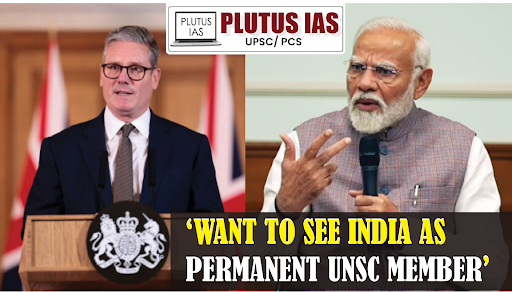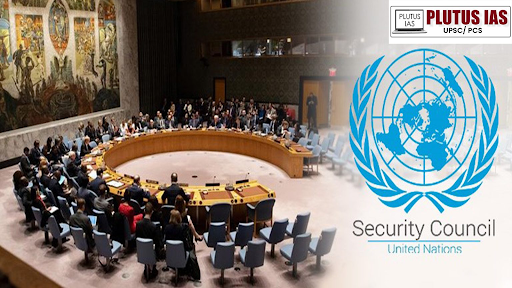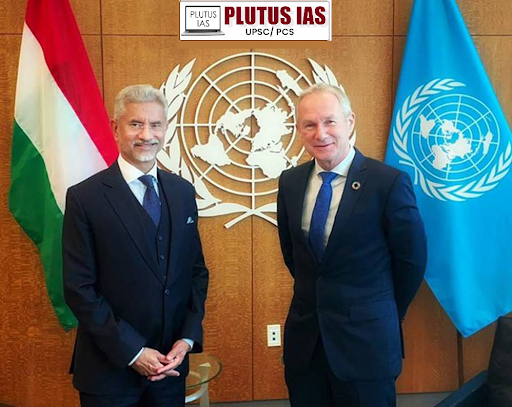30 Sep “Reforming the UNSC: India’s Path to Permanent Membership”
This article covers “Daily Current Affairs” and topic details of the UNSC reforms.
Syllabus mapping:
GS-2: International Relations: International Organizations and its mandate.
For Prelims:
What are the annual summits of the UN, Credential Committee, UNSC, and its mandate?
For Mains:
What is the mandate of various UN organs and its present working, challenges, and way forward?
Why in the News?
UK PM Keir Starmer backs India’s bid for permanent UNSC seat, joining US and France: ‘Security Council has to change…

United Nations Security Council (UNSC)
Established: Founded in 1945 as part of the UN Charter, the UNSC is the UN’s most powerful organ.
Composition: Comprises 15 members—5 permanent (P5) and 10 non-permanent members.
Permanent Members: The P5 includes the United States, United Kingdom, France, Russia, and China, each holding veto power over substantive resolutions.
Non-Permanent Members: Elected for two-year terms, five non-permanent members rotate off annually, with elections conducted by the General Assembly.
Primary Responsibilities: The UNSC maintains international peace and security, investigates conflicts, and authorizes peacekeeping missions.
Resolutions: UNSC resolutions are binding on member states and capable of imposing sanctions or authorizing the use of force.
Veto Power: The P5’s veto power can lead to political gridlock and significant implications for decision-making.
Meetings: The UNSC meets regularly; decisions require a majority of present members, except for those needing a veto.
Peacekeeping Operations: The UNSC authorizes peacekeeping missions, typically led by the Department of Peace Operations.

Demand for UNSC Reforms:
Post-Dated Cheque: The UNSC is often seen as outdated, reflecting a world order that no longer aligns with current geopolitical realities.
Growing Conflicts: Ongoing conflicts, such as those between Israel and Palestine, highlight the Council’s inability to effectively mediate and resolve crises.
Ukraine-Russia Conflict: The UNSC’s paralysis during the Ukraine-Russia conflict underscores its limitations in addressing contemporary security threats.
Vested Interests of P5 Members: The permanent members (P5) often prioritize their national interests over global security, impeding impartial decision-making.
Intra-Council Divisions: Significant divisions between blocs, particularly between Russia and the US-led West, hinder cohesive action on critical issues.
Exclusion of Africa and Latin America: The current structure marginalizes voices from Africa and Latin America, which are underrepresented in discussions affecting global peace.
Overrepresentation of the EU: The disproportionate representation of European nations in the UNSC fails to reflect the diversity of global perspectives and interests.
Failure to Address Emerging Threats: The UNSC has struggled to respond effectively to non-traditional security threats, such as climate change and terrorism.
Inconsistent Peacekeeping Efforts: The Council’s inconsistent approach to authorizing peacekeeping missions raises questions about its commitment to global security.
Public Discontent: Growing public awareness and dissatisfaction with the UNSC’s effectiveness have led to calls for reform from various nations and civil society groups.
Need for Greater Accountability: Current members of the UNSC often evade accountability for their actions, highlighting the need for a more transparent decision-making process.
Changing Global Power Dynamics: The rise of new powers, particularly in Asia and Africa, necessitates a reevaluation of the UNSC’s composition to include these emerging voices.
India’s Claim for Permanent UNSC Membership
Largest Democracy: India is the world’s most populous democracy, embodying the values of a rule-based democratic nation that upholds human rights and governance.
Major Contributor to UN Peacekeeping Forces: India is the second-largest contributor to UN peacekeeping missions, demonstrating its commitment to global peace and stability.
Growing Economy: As one of the fastest-growing major economies, India’s economic influence positions it as a key player in global development and trade.
Military Power: India boasts the third-largest military in the world, contributing to regional and global security.
Leader of the Global South: India plays a vital role in representing the interests of developing countries, advocating for their concerns on international platforms.
International Initiatives: India leads several significant global initiatives, such as the International Solar Alliance (ISA) and Mission LiFE (Lifestyle for Environment), showcasing its commitment to sustainable development.
Vocal for a Rules-Based Order: India consistently advocates for a rules-based international order, promoting peace and stability through multilateral cooperation.
Transparent Nuclear Policy: India maintains an open and transparent nuclear policy, contributing to regional security and global non-proliferation efforts.
Adherence to International Law: India has a strong track record of adhering to international laws and norms, reflecting its commitment to a fair and just global system.
Diverse and Inclusive Society: As a multicultural nation, India exemplifies inclusivity and respect for diverse viewpoints, enriching global dialogue and cooperation.
Challenges to India’s UNSC Membership and UNSC Reforms
Rough Attitude of P5 Members: The existing permanent members often exhibit reluctance to accept new members, prioritizing their own interests over a more representative Council.
Opposition from Pakistan: Pakistan actively opposes India’s bid for permanent membership, leveraging its influence to rally support against India within various international forums.
Coalitions Against Consensus: Groups of nations often unite to block reforms, creating obstacles to India’s ambitions and broader UNSC restructuring.
Lower Contribution to UN Funds: India’s relatively lower financial contributions to the UN compared to some other nations may be seen as a liability in its bid for membership.
Ambiguous Foreign Policy: India’s perceived ambiguity on certain international issues can raise concerns about its reliability as a UNSC member.
Questions of Responsibility: Critics, including some like CR Mohan, question whether India is ready to assume the larger responsibilities that come with permanent membership.
Domestic Policy Challenges: The rise of majoritarianism in India’s domestic policies may lead to apprehensions among other nations regarding its commitment to international norms.
Diverse Internal Challenges: India faces various internal challenges, including socio-economic disparities and regional tensions, which may affect its foreign policy stability.
China as a Main Opponent: China remains one of the principal opponents of India’s UNSC membership, seeking to maintain its own regional influence and counterbalance India’s rise.
Non-Cooperation from Many Countries: Several nations are either indifferent to or actively resist the push for UNSC reforms, complicating India’s aspirations for membership.
Way Forward for UNSC Reform and India’s Membership Bid
Consensus Among Potential Members: Building a united front among potential new members, such as India, Germany, and Argentina, is crucial for strengthening collective bargaining power in reform discussions.
Evaluation of Membership Bids: Monitoring and adapting to the evolving bids of these potential members can help create a strategic framework for effective advocacy.
Passing a UNGA Resolution: Advocating for a resolution in the UN General Assembly that outlines specific reforms to the UNSC can catalyze change and attract broader support.
Non-Veto Permanent Members: Establishing a category of non-veto permanent members can help balance power dynamics and increase the Council’s legitimacy.
Increased Contributions from Members: Encouraging greater financial and military contributions from potential members will enhance their claims to membership and strengthen the UNSC’s capabilities.
Support for Conflict Resolution: Shifting the focus from a block mentality to collaborative problem-solving can foster a more productive environment within the UNSC.
Ceding Absolute Power by P5 Members: Acknowledging the need for shared power and responsibilities among all members can lead to a more equitable decision-making process.
Prioritizing Africa and Latin America: Ensuring that Africa and Latin America receive adequate representation in the UNSC is vital for addressing the concerns of the Global South.
Enhancing Transparency and Accountability: Improving the decision-making processes of the UNSC can increase its credibility and make it more responsive to global challenges.
Engaging Civil Society and Public Opinion: Involving civil society organizations and public opinion can create pressure for reform and highlight the need for a more representative UNSC.

Conclusion:
As the world’s third-largest military power and a nation representing 1.4 billion voices, India’s presence in the United Nations Security Council (UNSC) is not just desirable; it is essential. With India being the second-largest contributor to UN peacekeeping forces, its involvement in the UNSC would ensure that the diverse perspectives of its populace are reflected in global decision-making.
Prelims Question:
Q. With reference to the United Nations Credential Committee(UNSCC) Consider the following statement:
1. The UNSCC is appointed for regular and emergency sessions by the UNSC.
2. The UNCC checks the credentials of the representatives of the UN members representing at the session.
3. The UNCC must include one of the permanent members of the UNSC in its 9 members.
How many of the above-given statements are correct?
A. Only one
B. Only two
C. All three
D. None
ANSWER: A
Mains Question:
India’s claim for permanent membership at The UNSC is full of challenges and opportunities. Explain in context the growing support for India’s permanent membership. (Answer in 250 words)



No Comments